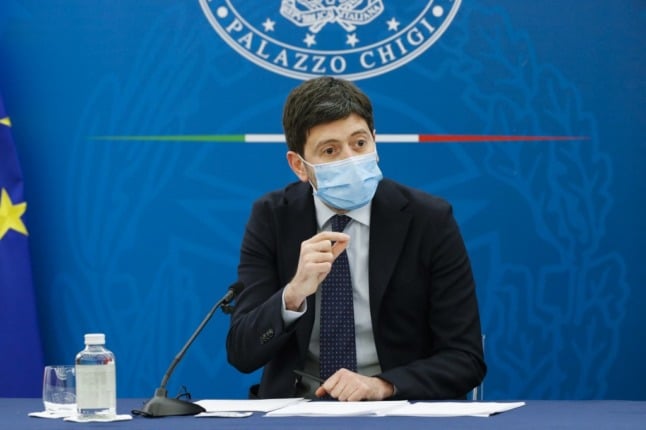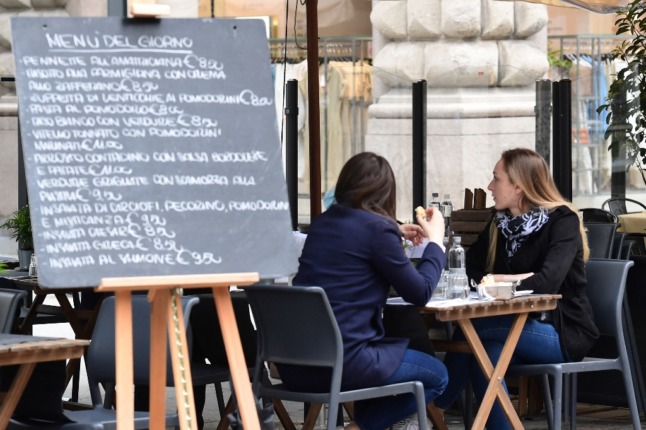The political debate continues about the nightly ban on movement between 10pm and 5am, especially since restaurants were allowed to re-open for dinner in low-risk yellow zones.
A change to the measure might come into force as early as next week, and could see the curfew pushed back to 11pm or midnight. Or, if some politicians get their way, it could even be scrapped altogether ahead of the summer season.
READ MORE: Quarantine, curfew and weddings: What rules will Italy relax next?
So who’s for and against the change?
Broadly, the right-wing League and its supporters are pushing for the curfew to be relaxed or scrapped.
Though not ruling it out, Health Minister Roberto Speranza is taking a more cautious view, calling for a more gradual approach based on the latest data.

It’s another tug of war between boosting the economy and protecting public health.
“Re-openings, re-openings, re-openings,” urged League leader Matteo Salvini. “Back to work, day and night and without curfew, trusting the Italians.”
Others are also for easing measures without scrapping them altogether.
Friuli Venezia-Giulia’s governor Massimiliano Fedriga has called for a more relaxed curfew of 11pm to 5am. Interior Ministry undersecretary Carlo Sibilia, on the other hand, is in favour of starting the curfew at midnight.
READ MORE: What will Italy’s coronavirus rules be for summer 2021?
Thinking of the summer season, Foreign Minister Luigi Di Maio has also called for “lighter measures to attract tourists to Italy”.
Easing the curfew by an hour or two would surely make for a more a relaxed dining experience.
For dinner remember to book restaurant before 7pm, and eat it before the 9pm, because at 10pm you must stay at home. #Curfew #coprifuoco https://t.co/hYOprjTKTN
— Danilo De Matteis (@Milo20i) May 5, 2021
Any decision will depend on the latest weekly epidemiological data, released every Friday by Italy’s top health institute, the ISS. The figures have been slowly improving for several weeks now.
“Given that the choice comes down to politics, and given that Friday’s numbers will be used to make decisions, I believe that there is scope for a further extension of the time when movement is restricted,” commented the head of the government’s committee of scientific advisors, Franco Locatelli.
“As for whether it’s 11pm or midnight, that’s up to the government,” he told Italian TV channel Rai3 on Wednesday.
READ MORE: Will Italy relax the Covid mask-wearing rules this summer?
Other health experts have expressed concern about the talk of relaxing curfew. Massimo Galli, director of Infectious Diseases at Milan’s Sacco Hospital, told Rai3: “I realise that there are the needs of those who have their main economic activity in the evening and are not able to survive, but that’s another matter from a strictly epidemiological point of view.”
He conceded that some contact is inevitable in order to keep the country moving, but there had to be sacrifice or “downsizing” somewhere.
It’s a sentiment echoed by Andrea Crisanti, director of the Department of Microbiology at the University of Padua: “The curfew reduces the likelihood of people meeting each other and therefore transmitting the virus,” he told TV news programme LA7.
READ ALSO: Who is eligible for a Covid-19 vaccine in your region of Italy?
France recently announced plans to phase out its curfew by the end of June, while Spain scrapped its curfew altogether this week – prompting street parties and a rebuke from the government.
Meanwhile Germany says people who have been fully vaccinated are exempt from curfew and other rules.
Italy’s government is expected to announce a decision after Prime Minister Mario Draghi next meets with the cabinet on Monday May 17th, making Tuesday May 18th the earliest date that the curfew could change.
Monday’s meeting is also expected to result in new plans for the reopening of travel, indoor dining, gyms, shopping centres and other businesses over the coming weeks.



 Please whitelist us to continue reading.
Please whitelist us to continue reading.
Member comments